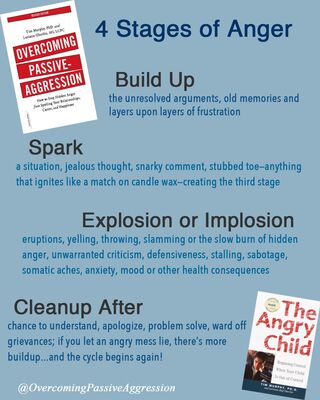Anger
Speaking Up When Most Stressed
Remaining silent harms your health and rehearses your fury.
Posted March 5, 2022 Reviewed by Vanessa Lancaster
Key points
- Cold anger, marked by silence, is a primitive and regressive way to express hostility.
- Listening non-defensively to feedback and negatives proves to be an important life skill.
- A broader emotional vocabulary helps people mention and manage difficult topics as they become less conflict-averse.
Instead of meeting wife Lindsay’s requests, Ron kept “forgetting,” and when Lindsay tried to create a dialogue, Ron went silent—for weeks—while refusing to help out. Many of the things Ron did accomplish were not things Lindsay appreciated.
W. Robert Nay wrote of this couple in Overcoming Anger in Your Relationship, where his litmus test for passive anger includes: withheld affection, praise or positives, stalled problem solving, vague responses, or radio silence.1
“Passive anger may have its roots in a life script learned in the distant past, a script that now directs how the person thinks, feels, and acts when confronted by conflict,” wrote Nay. This creates a serious imbalance where Ron evokes intense emotions that he’ll hold against Lindsay. Nay dubs this cold anger, explaining it as a primitive, regressive, and infantile means of expressing bottled-up hostility. Often intended to punish or freeze out, the behavior finger points as denial or a way to shield one’s insecure self.

Communicate Amid Conflict
John Gottman and Lowell Krokoff published a study finding that disagreement over the long term of a relationship is not harmful; withdrawal from conflict and continued defensiveness and inflexibility, however, leads to relationship demise.2
Indeed improving your ability to remain calm amid disagreement improves a relationship. Listening non-defensively to feedback and negative feelings become a basic life skill. Otherwise, unfavorable negativity overwhelms and obliterates positive sentiments, which should override negatives by a 5:1 ratio.3
Hidden Anger Harms Health
Physicians and anger management researchers have uncovered at least 15 links between harboring negative, angry emotions and harm done to one’s mental and physical health. Among them:
- Higher blood pressure and inflammation that leads to many diseases.
- Increased C-reactive protein associated with heart disease and stroke risk.
- Escalated cortisol and adrenaline (fight/flight hormones).
- Suppressed reproductive system, sexual dysfunction, and fertility.
- Weakened immune response, cellular deterioration, and premature aging.
- Increased risk of periodontitis.
- Persistent anxiety, depression, aches/pains, and weight problems.
Find the entire list of how concealed emotions harms one’s health in my book Overcoming Passive Aggression: How to Stop Hidden Anger from Spoiling Your Relationships, Career and Happiness.4
Your Voice Empowers You
Rather than feeling exhausted and aggravated by conflict, speak up to vocalize your most basic needs. This safeguards your mental and physical well-being.
“Whatever is mentionable is manageable,” said Fred Rogers, known as the emotional advocate for children and adults. If you can voice a topic or put it into the space between you and another person, often beginning with “I messages,” you can summon the strength, skills, and understanding to manage and resolve the problem.
Build an emotional vocabulary to label negative emotions. This removes the fear of expressing yourself. Find feeling charts/wheels online through an image search. List words using a thesaurus. Choose the precise feeling word which may reveal vulnerability. That’s okay. Opening up and being vulnerable leads to deeper interpersonal connection and intimacy for romantic relationships.
“Focus on interests rather than positions,” wrote Roger Fisher and William Ury in Getting to Yes: Negotiating Agreement Without Giving In. 5 “We tend to assume that because the other side’s positions are opposed to ours, their interests must also be opposed. If we have an interest in defending ourselves, then they must want to attack us,” they continued, reporting that agreement is often made possible precisely because interests differ.
Learn to tackle issues. “When you solve problems and empower yourself, anger slowly dissipates because you unlearn some of the patterns that have rendered you stuck,” my co-author Tim Murphy and I wrote in Overcoming Passive Aggression.
Refuse to fence sit. Blame less and take responsibility more. Give up vague answers and phrases that stall decisions. Jettison words like “maybe,” “possibly,” and “to a certain extent.” People pleasers have ingrained these phrases into unhelpful habits that challenge interpersonal and career progress.

Attend to the four stages of anger as outlined in Overcoming Passive Aggression and The Angry Child. If you do not clean up (stage four), your issues cascade right back to the build-up (stage one), the spark (stage two), and the explosion or implosion (stage three).6 So, too, realize that two people can actually both be right in any disagreement aftermath.
Every plot twist in your conflict does not mean that someone is at fault. Finger-pointing and blame result in resentment. Give up these poor habits for peace, getting to yes and agreement.
Copyright @ 2022 by Loriann Oberlin, MS
See Also: Problem Solving Your Stress and
References
1. Nay, W.R. Overcoming Anger In Your Relationship: How to Break the Cycle of Arguments, Put-Downs and Stony Silences (New York: Guilford, 2010); https://tinyurl.com/Anger-in-Relationship
2. J.M. Gottman and L.K. Krokoff, “Marital Interaction and Satisfaction: A Longitudinal View,” Journal of Consulting and Clinical Psychology, 57, no. 1 (1989): 47-52, as reported in chapter six, Overcoming Passive-Aggression: How to Stop Hidden Anger from Spoiling Your Relationships, Career and Happiness by Tim Murphy, Ph.D. and Loriann Oberlin, MS, LCPC (New York: Hachette/DaCapo, 2016); https://psycnet.apa.org/record/1989-25730-001
3. Gottman, J.M. and Silver, N. The Seven Principles for Making Marriage Work (New York: Random House, 2015); https://tinyurl.com/Seven-Principles-Marriage
4. Murphy, T and Oberlin, L. Overcoming Passive-Aggression: How to Stop Hidden Anger from Spoiling Your Relationships, Career and Happiness (New York: Hachette/DaCapo, 2016); https://tinyurl.com/OPA-Barnes-Noble and https://tinyurl.com/OPA-Kindle
5. Fisher, R. and Ury, W. Getting to Yes: Negotiating Agreement Without Giving In (New York: Penguin Group, 1991); https://tinyurl.com/Getting-to-Yes
6. Murphy, T and Oberlin, L. The Angry Child: Regaining Control When Your Child Is Out of Control (New York: Hachette/DaCapo, 2016); https://tinyurl.com/Angry-Child-BN-Paperback and https://tinyurl.com/Angry-Child-Kindle




